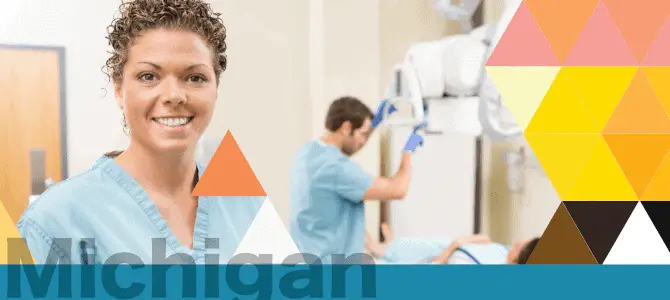Radiation Therapy Schools in Michigan

The primary route to qualify as a Radiation Therapist in Michigan is to complete a four-year baccalaureate degree in Radiation Therapy. These types of programs are offered by several universities across the state. Students usually complete two years of general education requirements before being admitted to the upper-division for a further two years of pre-professional coursework to qualify as a Radiation Therapist.
In This Article
How to obtain professional credentials as a Radiation Therapist in Michigan
As the state of Michigan does not require Radiation Therapists to be licensed, obtaining professional credentials as a Radiation Therapist may assist individuals by providing evidence of their competence in order to secure employment.
Professional credentials for Radiation Therapists are available from the American Registry of Radiologic Technologists (ARRT) upon demonstration that the required criteria have been met. The criteria include completion of educational requirements, meeting certain ethical qualifications, and achieving a passing score on the ARRT examination.
Completion of a JRCERT accredited and ARRT approved bachelor’s program in Radiation Technology is sufficient to satisfy the educational criteria. Holders of associate degrees in Radiation Technology will also meet the educational threshold. Holders of associate or baccalaureate degrees in other subjects will need to demonstrate that they have also completed an ARRT-approved program of study in Radiation Therapy to satisfy this criterion.
Candidates with a record of previous felonies or misdemeanors may find that they are barred from membership of ARRT and unable to obtain professional credentials. All candidates are required to answer a series of ethical questions that inquire into previous levels of conduct during the application process and are also expected to take the time to review the ARRT Standard of Ethics document.
Examination Requirements – ARRT requires candidates to achieve a scaled score of at least 75 on its professional certification examination for Radiation Therapists. The content of the examination mirrors the topics that are covered during a typical Radiation Therapy education program and include underpinning concepts of radiation therapy and its use in oncology treatment, the safe use of radiation therapies and equipment, treatment planning and evaluation, and patient care, communication, and comfort. The computer-based examination is four hours long and may only be attempted three times in each three year period.
ARRT encourages Radiation Therapists to keep their skills and knowledge up to date by requiring its members to complete a certain number of Continuing Education credits every two years. In addition, once every ten years, ARRT members must also obtain required Continuing Qualification credits in order to retain their membership of the organization and their possession of professional credentials.
How to become a licensed Radiation Therapist in Michigan
Michigan does not require Radiation Therapists to be licensed. Instead, it regulates and licenses equipment and facilities that use radiation through the Radiation Safety Section of the Department of Licensing and Regulatory Affairs.
Employers of Radiation Therapists in Michigan are therefore likely to look for candidates that hold professional credentials from the American Registry of Radiologic Technologists ARRT to demonstrate their competence as an alternative to possession of a state license.
View also:
- Radiologic technologist schools in Michigan
- Learn about radiation therapy education & career requirements
Sponsored Programs
The College of Health Care Professions , Online
Location - Mcallen, TX, US 78504The College of Health Care Professions is a Texas-based career education school founded by physicians in the Texas Medical Center solely specializing in healthcare education and dedicated to provid... Read More
ProgramsLimited Medical Radiologic Technologist with MA Skills - Certificate
Accredited Radiation Therapy Schools in Michigan
Baker College of Jackson
Baker College is Michigan’s largest independent, not-for-profit educational institution. It was founded in 1911 and maintains eight campuses across the state. It is a career college offering over 150 career programs within its system, although not all programs are available at every campus.
Baker College offers students the opportunity to enroll in a 120 credit baccalaureate program at its Jackson campus. The major in Radiation Therapy is accredited by the Joint Review Committee on Education in Radiologic Technology and approved by the American Registry of Radiologic Technologists (ARRT). The curriculum includes didactic classwork, labs, and clinical rotations.
1050 West Bristol Road
Flint, MI 48597
800-964-4299
Website: https://www.baker.edu/campuses/michigan/jackson
Grand Valley State University
Located just outside of Grand Rapids, Grand Valley State University is a public liberal arts university with approximately 25,000 students enrolled in 130-degree programs. Its ranking in the 2018 edition of Best Colleges is #29 in the Regional Universities Midwest category.
The university offers a four-year Bachelor of Science in Radiation Therapy. Students spend approximately two years completing general education and prerequisite courses before applying for competitive admission to the two-year upper division for their professional coursework.
The curriculum includes topics such as human sectional anatomy, medical dosimetry, radiation biology, radiation protection, radiation therapy physics, and image guidance in radiation therapy. Students will benefit from small class sizes, cohort educational experiences, and clinical rotations.
The American Registry of Radiologic Technologists (ARRT) has approved the program as suitable for candidates seeking to obtain their professional credentials, and the Joint Review Committee on Education in Radiologic Technology (JRCERT) have provided formal accreditation.
1 Campus Drive
Allendale, MI 49401
616-331-5000
Website: https://www.gvsu.edu/
University of Michigan – Flint
UM-Flint is a regional comprehensive university that offers over 100 undergraduate and 18 master’s degree programs in an urban setting. With just over 8,500 students and a student to faculty ratio of 15:1, UM-Flint aims to offer both personalized learning and opportunities for individual growth.
The UM-Flint Bachelor of Science in Radiation Therapy is a four-year, 124 credit degree program accredited by the Joint Review Committee on Education in Radiologic Technology (JRCERT). Graduates are eligible to take the Radiation Therapy Certification Examination given by the American Registry of Radiologic Technologists (ARRT).
The curriculum aims provide an interactive and interdisciplinary overview of theory-based radiation therapy practice while developing student skills in communication and collaboration alongside offering opportunities to gain hands-on practical experience.
303 East Kearsley Street
Flint, MI 48502
810-762-3322
Website: https://www.umflint.edu/
Wayne State University
Wayne State University is a public research and teaching university located in Detroit. Over 27,000 students are in attendance, and the university offers in excess of 380-degree programs.
Of interest to aspiring Radiation Therapists is the four year BS in Radiation Therapy. After completion of general education and pre-requisites, students are admitted for six semesters of pre-professional studies. The Bachelor of Science in Radiation Therapy at Wayne State is accredited by the Joint Review Committee on Education in Radiologic Technology (JRCERT) and qualifies as an approved educational program through the American Registry of Radiologic Technologists (ARRT).
Clinical experiences are integrated with coursework throughout the program. Each semester students experience three clinical rotation segments in each clinical education course. Each rotation is evaluated, providing students with detailed feedback to help them improve their clinical skills. Clinical rotations take place at one of five clinical sites located in the Detroit metropolitan area and provide a range of experiences from major cancer treatment centers to community hospitals.
259 Mack Avenue
Detroit, MI 48201
313-577-1716
Website: https://wayne.edu/

